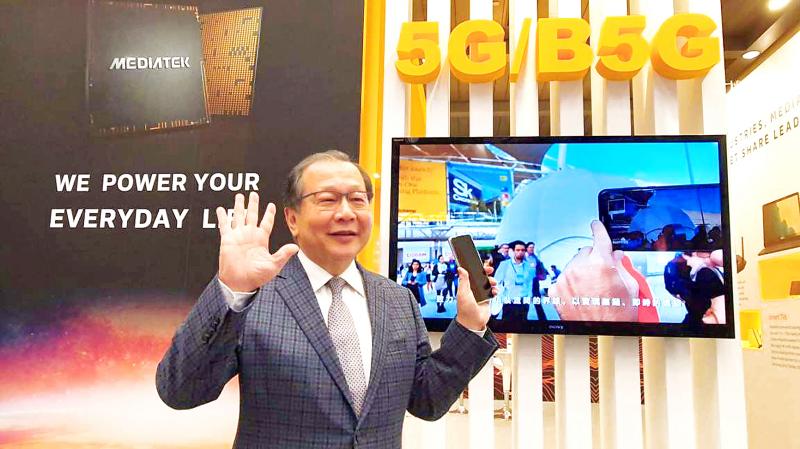MediaTek Inc (聯發科), the nation’s biggest supplier of chips used in smartphones, plans to launch its new flagship 5G chip by February in a bid to capture a bigger share of the rapidly growing market, a company executive said yesterday.
The announcement indicates that the Hsinchu-based chipmaker is gaining confidence about the rollout of its new 5G chip designed for premium smartphones. The chipmaker two months ago gave a more vague schedule, saying that new phones powered by its new Dimensity 5G chip would enter mass production early next year.
The remarks came after the company’s bigger rival Qualcomm Inc last week unveiled its new flagship 5G chip, the Snapdragon 888, for premium smartphones.

Photo: Vanessa Cho, Taipei Times
MediaTek said that its chip would be launched by the Lunar New Year, which falls in February, and that it expects replacement demand to take off next year as shipments of 5G handsets worldwide are set to double from more than 200 million units this year.
The growth momentum is set to carry into 2023, with the 5G penetration rate expected to climb to about 60 percent from 49 percent in 2022, MediaTek chief executive Rick Tsai (蔡力行) said in a speech entitled “Accelerating the Digital Economy post the COVID-19 pandemic” at the IEEE Global Communications Conference in Taipei yesterday.
The 5G smartphone penetration rate is expected to reach 18 percent this year, beating MediaTek’s expectations, Tsai said.
The company’s strategy is to build a comprehensive product portfolio for smartphones with different price points, he said, adding that the chipmaker plans to roll out a new 5G system-on-a-chip for entry-level smartphones.
The company’s high-end Dimensity 1000 chip has been adopted by LG Electronics Inc for its new 5G smartphone for US consumers, while Oppo Mobile Telecommunications Corp (歐珀) launched its Reno 4Z smartphone using the Dimensity 800 in Europe this quarter.
Thanks to its higher bandwidth and low latency, 5G technology is being adopted in applications beyond smartphones, including routers, connected devices, automotive wireless communications and industrial Internet-of-Things applications, Tsai said.
Working from home, remote study and the stay-at-home economy has become the new norm due to the COVID-19 pandemic, he said, adding that the trend is set to stay even after the pandemic subsides.
MediaTek has introduced multiple chips to address those demands, he added.
The company in the third quarter posted a more than 40 percent growth in revenue across the board, including chips used in Chromebooks.
Pandemic-induced lockdowns and constraints on movement are boosting the digital economy, Tsai said.
Mobile network traffic is set to grow at an annual compound rate of 26 percent through 2022 from 2018, mostly driven by the streaming of videos, he said.

Sweeping policy changes under US Secretary of Health and Human Services Robert F. Kennedy Jr are having a chilling effect on vaccine makers as anti-vaccine rhetoric has turned into concrete changes in inoculation schedules and recommendations, investors and executives said. The administration of US President Donald Trump has in the past year upended vaccine recommendations, with the country last month ending its longstanding guidance that all children receive inoculations against flu, hepatitis A and other diseases. The unprecedented changes have led to diminished vaccine usage, hurt the investment case for some biotechs, and created a drag that would likely dent revenues and

Macronix International Co (旺宏), the world’s biggest NOR flash memory supplier, yesterday said it would spend NT$22 billion (US$699.1 million) on capacity expansion this year to increase its production of mid-to-low-density memory chips as the world’s major memorychip suppliers are phasing out the market. The company said its planned capital expenditures are about 11 times higher than the NT$1.8 billion it spent on new facilities and equipment last year. A majority of this year’s outlay would be allocated to step up capacity of multi-level cell (MLC) NAND flash memory chips, which are used in embedded multimedia cards (eMMC), a managed

CULPRITS: Factors that affected the slip included falling global crude oil prices, wait-and-see consumer attitudes due to US tariffs and a different Lunar New Year holiday schedule Taiwan’s retail sales ended a nine-year growth streak last year, slipping 0.2 percent from a year earlier as uncertainty over US tariff policies affected demand for durable goods, data released on Friday by the Ministry of Economic Affairs showed. Last year’s retail sales totaled NT$4.84 trillion (US$153.27 billion), down about NT$9.5 billion, or 0.2 percent, from 2024. Despite the decline, the figure was still the second-highest annual sales total on record. Ministry statistics department deputy head Chen Yu-fang (陳玉芳) said sales of cars, motorcycles and related products, which accounted for 17.4 percent of total retail rales last year, fell NT$68.1 billion, or

In the wake of strong global demand for AI applications, Taiwan’s export-oriented economy accelerated with the composite index of economic indicators flashing the first “red” light in December for one year, indicating the economy is in booming mode, the National Development Council (NDC) said yesterday. Moreover, the index of leading indicators, which gauges the potential state of the economy over the next six months, also moved higher in December amid growing optimism over the outlook, the NDC said. In December, the index of economic indicators rose one point from a month earlier to 38, at the lower end of the “red” light.